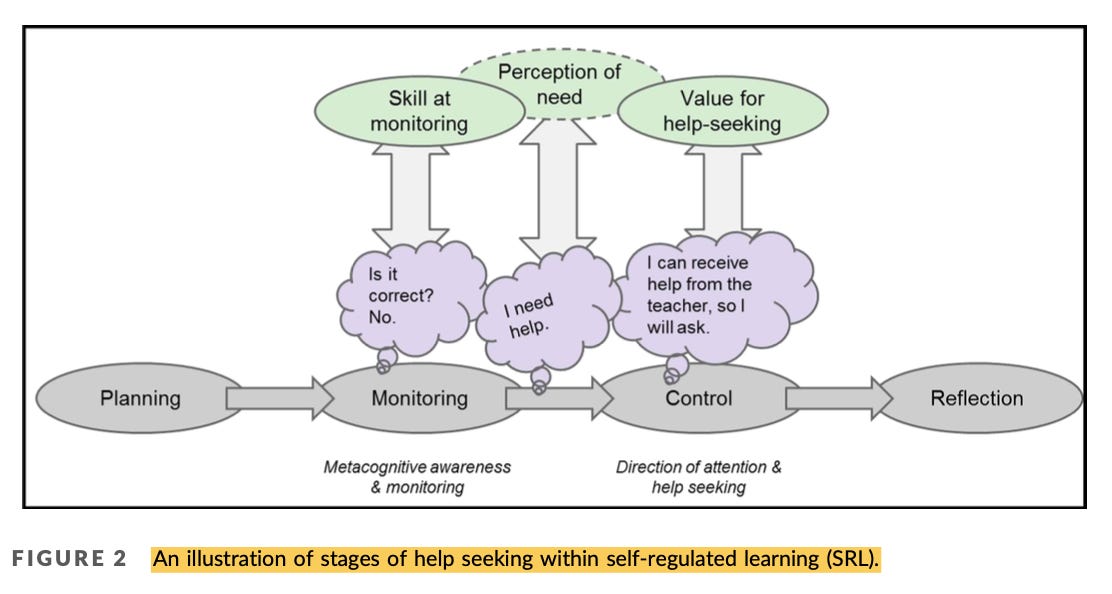Do we need a refreshed theory of help-seeking?
From my perspective, the help-seeking literature has kind of stalled out. That’s surprising because student help-seeking is pretty darn important. Students need to have the skills to know when they need help, to seek the appropriate type of help, and to implement that help to not only complete a task but also update their knowledge and skill so they don’t need that particular type of help again in the future. For example, if a student is struggling to correctly use the Pythagorean Theorem for a problem, they need to the ability to metacognitively monitor when it’s clear they lack sufficient knowledge to solve problem (e.g., “okay, I’ve tried everything I know and I’m just not getting the right answer”), then they need to have adaptive beliefs about help-seeking (e.g,., “everybody needs help sometimes and it’s a good thing to seek help”) and what types to seek (e.g., “help-me-better-understand help, not just-give-me-the-answer help”), and then they need to use the help they sought to not only solve the problem they are struggling on but also to update their knowledge and skill in long-term memory so they won’t have the same struggles the next time they work on a similar problem. Clearly, there’s a lot to conceptualize, operationalize, model, and understand about help-seeking and how it relates to other student factors (e.g., motivation, strategy use, etc.) and contextual factors (e.g., classroom and other environmental messages about needing help, differences across academic domains, etc.). That’s why I was excited to see Rutherford et al’s (2023) study on help-seeking, wherein they posited and tested a new model of help-seeking with self-regulated learning (SRL).
I really liked their Figure 2:

Integrating metacognitive monitoring skill, perceptions of need for help, and value for help-seeking into a SRL model framework makes sense to me and seems like a nice update and refresh to help-seeking theory. (And if someday they want to publish a theoretical article on help-seeking, they might find my article on theory development…helpful; and I hope they consider Educational Psychologist as a potential venue for their work.)
Their study was rigorously analyzed but, as the authors acknowledged, they were up against some tough challenges: they used actual student learning data (as opposed to lab studies where you can increase internal validity often at the expense of external) which can be tough to gather, it was a secondary data analysis (in this kind of work, researchers often wish they could have had more input on measures, etc.), and their model is fundamentally interactional in nature, meaning that they’d need large samples of students and classrooms to be sufficiently powered to detect those interactions. I think they found enough evidence to continue pursuing their model, for sure, but the findings at this point are pretty tentative/exploratory. That’s totally fine and appropriate. I like “big swings” - studies that make novel, bold claims and do their best to find evidence of them, even when conditions, sample sizes, etc aren’t optimal. I have no problem with studies like this as long as the authors are forthright about their limitations and explicitly label the findings as exploratory, which the authors did. There’s value in taking a big swing and finding promising, if not technically perfect, results. I hope this study can lead to better powered (and often that means “better/more funded” - so good luck on any grant proposals around this model!) research on this model. I do think it has real potential in an area that seems to have stalled out theory-wise: help-seeking.
Music I listened to while writing this post: None, just the sweet song of nature, heard while sitting on my deck.